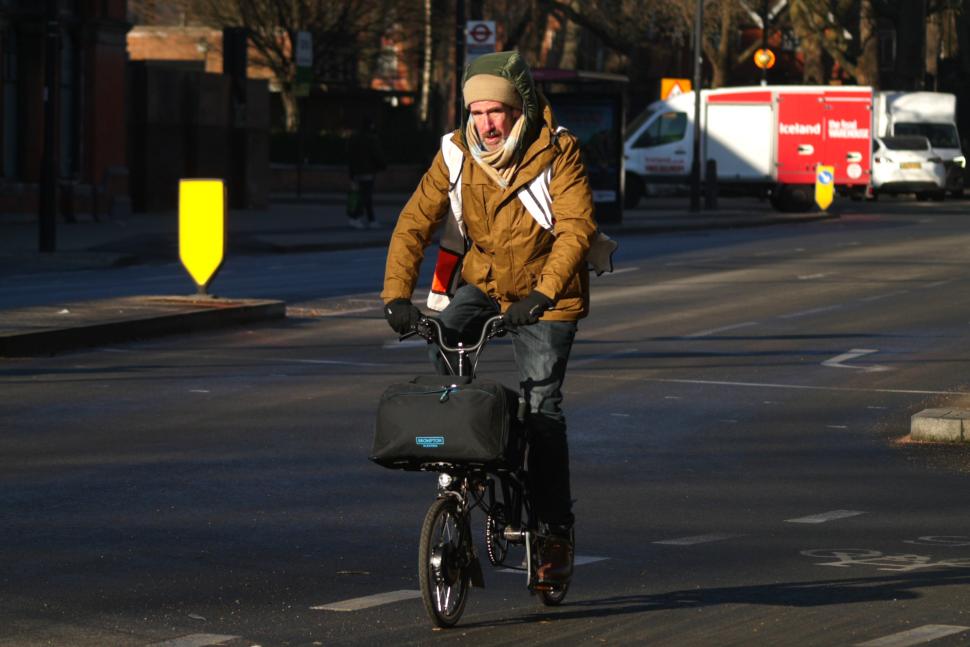The challenges faced by the bike industry over the past few years appear to show no signs of abating in 2025, after Brompton’s managing director warned that the cycling industry “will not get better this year”, as the folding bicycle manufacturer revealed that its profits have plunged by over 99 per cent following a “challenging” year.
While Brompton appeared to be weathering the storm engulfing the cycling market better than most, as profits jumped by 35 per cent in 2023, the iconic folding bike brand’s latest accounts make for more sobering reading, as the British manufacturer cited increased operational costs, an over-dependency on China, and heavy discounting by rivals as key factors behind its recent nosedive in profits.
In the company’s figures for the financial year to 31 March 2024, overall turnover fell by 5.3 per cent compared to the previous year (from £129.4m to £122.6m) as the total number of bikes sold (84,899) dropped by 8.2 per cent, from 91,785, a consequence Brompton says of the “wider global economic uncertainty and challenges in the cycling industry”.
This has resulted in a pre-tax profit of just £4,602 for the year – the equivalent of one of the brand’s top-of-the-range T Line models – down from £10,680,953 the previous year.
Profit before tax, meanwhile, represented a 0.0 per cent margin on sales (compared to 8.3 per cent in 2023), a decrease attributed to the “miss in budgeted sales” by the company, as well as the “delay in being able to respond with a reduction in costs due the committed and fixed nature of a number of them”.
Brompton also noted that its reliance on exports continues, accounting for 80 per cent of all bike unit sales (up from 74 per cent the previous year).
However, the company says that thanks to the ramping up of its T Line and P Line models, “we have continued to see a shift towards more premium products in the Brompton range”.
“This has resulted in an increased average revenue per bike, enabling the Group to partially offset the reduction in revenue arising from the fall in unit sales,” the manufacturer said.
Elsewhere, direct to consumer sales have continued to grow, while operating costs increased by 15 per cent to £62,710,382, accounting for 51 per cent of revenue, “largely arising from increased staff and marketing costs related to the expected growth of the business”.
Responding to these figures, Brompton’s managing director Will Butler-Adams said the fall in profits was due to selling fewer bikes than expected amid a “really sad state of affairs” for the global bike industry as it struggles to adapt in the wake of the post-pandemic boom.
Since that Covid-era surge, consumers have been less willing to spend due to inflation and other economic factors, while more specific challenges have impacted bike brands, such as excess inventory left over from when demand was high and the impact of supply chain issues.
Butler-Adams said that Brompton has particularly been hit hard by other brands implementing heavy discounting to clear stock, while the rise of cheaper folding bike rivals has prompted the company to introduce wider design protection on future products and appoint a brand protection agency to identify what they deem to be intellectual property right breaches.
And despite China being a key strategic market, Brompton has noted that this “concentration” presents risks, particularly when it comes to supply chain issues, with the company recently establishing a more diverse supply chain across Asia and Europe, while adopting new growth initiatives in other markets, such as Germany, the US, and Japan, to “reduce dependency on China and ensure greater resilience”.
Butler-Adams added that Brompton was also positive about the launch of its “more rugged” G Line bike, especially its electric version.
However, last month, the company recalled its G Line bikes over a single report of a Hinge Spindle breaking. Releasing a statement on its website, Brompton reported that there had been one instance that did not result in injury or incident, but said “we are constantly working to improve so have taken the decision to change the Hinge Spindle to one which has increased durability”.
Meanwhile, Butler-Adams also pointed out that the “retail environment has been decimated” for bike sales in the UK, following the loss of major online retailers like Wiggle and independent chains such as Cycle Republic in recent years.
“The industry is still in turmoil and will not get better this year. It will not be as bad as 2024 but there is still excess stock,” he said.
Faced with these most recent figures, Brompton has put plans to move to a new “car-free” headquarters in Kent, first unveiled in 2022, on hold and cancelled the dividend to shareholders after profits fell.
> Brompton CEO bemoans “bloody Brexit” for ongoing problems within bike industry
Nevertheless, Butler-Adams believes Brompton’s “more utilitarian” range of bikes designed for commuting will continue to appeal as cities across the world introduce more cycling infrastructure.
“London, Edinburgh, New York, Seville, Paris all have the momentum of getting people more active for air quality and trying to get people fitter. In the macro picture things are going in the right direction. The industry shot itself in the foot but that will roll out,” he said.
Finally, Butler-Adams noted that there were “opportunities on the other side” for those bike companies which are still able to invest during the current turbulent period for the industry.



